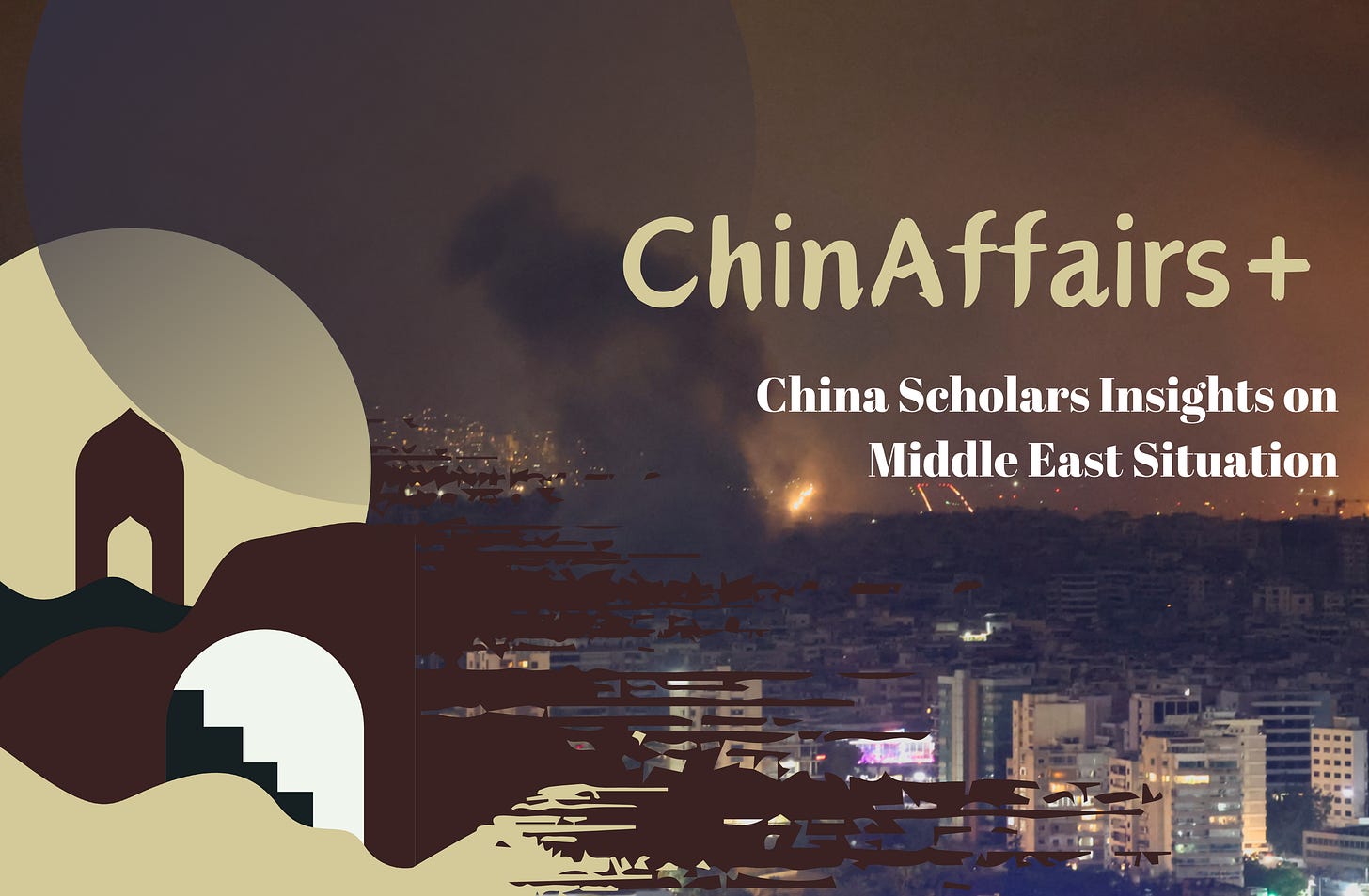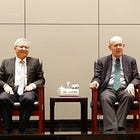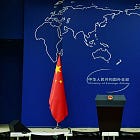#1 China Scholar Insights:Conflict in the Middle East
The instability in the Middle East may endure for an extended period.
Welcome to the first edition of China Scholar Insights!
China Scholar Insights is a newly launched feature by ChinAffairs+, which aimed at providing you with the latest analysis on issues that Chinese scholars and strategic communities are focusing on. We will carefully select commentary articles and highlight key points. Questions or criticisms can be directed to sunchenghao@tsinghua.edu.cn.
ChinAffairs+ is a newsletter that shares Chinese academic articles focused on topics such as China’s foreign policy, China-U.S. relations, China-European relations, and more. This newsletter was co-founded by me and my research assistant, ZHANG Xueyu. I am SUN Chenghao, a fellow with the Center for International Security and Strategy (CISS) at Tsinghua University, and currently a visiting scholar at the Paul Tsai China Center of Yale Law School.
Chinese Scholars on Conflict in the Middle East: Escalation or De-escalation?

Background
On October 16th, the leader of Hamas in the Gaza Strip, Sinwar, was assassinated; on the 22nd, the Israeli military launched attacks on multiple locations in Lebanon. The international community has paid close attention to these developments. October 20th, the United Nations Special Coordinator for the Middle East Peace Process condemned the renewed Israeli airstrikes on the Gaza. It is now a year since the outbreak of the latest round of the Israeli-Palestinian conflict. However, the situation has not eased but has spilled over to other regions, prompting extensive discussions within the international community.
Summary
In response to Israel's attacks, Middle Eastern countries are increasingly focused on protecting their national interests, making the “Axis of Resistance” less stable. Coupled with Israel's military advantage over this axis, its resistance is unlikely to be effective in practice, suggesting that it may be dismantled piece by piece. Furthermore, non-state actors have played a pivotal role in the conflict, resulting in a crisis of legitimacy and effectiveness in peace negotiations. However, even if the conflict escalates, it would be premature to label it a “Middle East war”, as Israel remains the only state actor currently engaged in hostilities.
When it comes to U.S. impacts, while the U.S. does not desire a prolonged, overflowing, and escalating Israeli-Palestinian conflict, its substantial aid to Israel has enabled the country to act at will. The U.S. support for Israel and Arab states against Iran forms the foundation of its Middle East strategy, which may change after the presidential election. In light of the significant escalation in the Middle East situation, scholars believe that China should continue to advance its Global Security Initiative, promoting the political resolution of conflicts through multiple avenues.
Insights
LIU Zhongmin: After Sinwar’s death, a turning point in this round of Israeli-Palestinian conflict may be near
Israel’s Major Strategic Shift Accelerates Regional Deterioration
One year into the renewed Israeli-Palestinian conflict, Israel’s three major strategic objectives has yielded minimal results, and itself has fallen into a predicament of intensifying internal crises and external diplomatic isolation. However, Israel has redirected its strategic emphasis from Gaza towards Lebanon and Iran, thereby securing a strategic advantage towards Hezbollah.
The Strategic Disadvantages and Dilemmas of the “Axis of Resistance” Intensify
On the other hand, the “Axis of Resistance” has lost its initial advantage against Israel and has fallen into a profound strategic dilemma due to Israel’s strong military strikes and the United States’ sustainable support; non-state actors lack legitimacy and do not possess military technology and sustainable warfare capabilities; and the leader of the “Axis of Resistance”, Iran, is caught in a dilemma balancing domestic development and warfare.
Future Trajectories: Peace or War?
The trajectory of the conflict, whether towards peace or further escalation, hinges on Israel's choice between military strikes and a peaceful resolution; Iran's decision to lead the “Axis of Resistance” or to compromise; the uncertainty of U.S. policy on the Israeli-Palestinian conflict.It is plausible that the “Axis of Resistance” and the United States may lean towards de-escalation, but Israel’s policy direction is crucial for the immediate reduction of hostilities. The willingness of both the United States and Israel to adjust their policies positively will be pivotal in determining whether the Israeli-Palestinian conflict can return to a political resolution path.
In summary, the internal dynamics within the Israeli-Palestinian conflict harbor both positive and negative catalysts for a turning point, with the potential for a shift towards moderation outweighing the risk of escalation into large-scale conflict or war.
LIU Zhongmin is the Professor of Middle East Studies, Shanghai International Studies University, Vice President of the Chinese Middle East Society. The original article was published in the column of The Paper(澎湃), edited by Zhu Zhengyong.
WANG Jin: The impact of sub-national actors in the reshaping of Middle East chessboard after a year of the new Israeli-Palestinian conflict
The conflict has not only been confined to the Gaza Strip but has also spread to surrounding areas, escalating on several occasions into direct conflicts between regional powers like Israel and Iran. This conflict has shifted Israel's strategic thinking, exposed the illusory nature of “brotherly bonds” among Middle Eastern countries, and brought new challenges to the established international order from sub-state actors.
Change in Israel’s Security Thinking--Is it possible to pursue peace through strength
The large-scale abrupt attack by Hamas on October 7th last year breached Israel's southern border defenses, resulting in the highest single-day casualty count since Israel’s founding in 1948,The catastrophic event, which has dealt a heavy blow to the Israeli public's confidence in the country’s national security and intelligence apparatus. Consequently, Israel’s perception of external threats has become acutely sensitive, prompting a more proactive and aggressive foreign policy stance.
Israel has realized that its existing means of combat are insufficient to achieve effective deterrence and guarantee national security. Now it views the conflict range as expanded to seven fronts, including operations against Hamas in Gaza, Hezbollah in Lebanon, Palestinian extremists in the West Bank, and military actions against Iraq, Syria, Yemen, and Iran. Additionally, Israel believes that it is now encircled by a so-called “Axis of Resistance.” However, the author contends that while Israel’s expansion of its strategic space and elevation of its early-warning geographical range may bring short-term security, it cannot ensure long-term safety.
The Illusion of “Brotherly Bonds”
Middle Eastern countries, facing practical interests, have abandoned the moral bonds of Arab and religious “brotherhood.” Despite strong rhetoric, Middle Eastern countries have not made substantial responses to Israel’s aggressive stance. Countries like Saudi Arabia and Egypt have not launched direct military attacks on Israel, and Iran’s missile attacks have been more symbolic than substantive.
Unregulated Sub-State Actors
Sub-state actors have become central players in the conflict with Israel. These groups have directly attacked Israel and have become influential beyond their home countries, affecting regional geopolitics.
The role of these sub-state actors has complicated peace mediation efforts in the Middle East, creating a divergence between legitimacy and reality in conflict resolution. A prime example is the situation between Israel and Lebanon. The international community can attempt to mediate the conflict between the Israeli and Lebanese governments, but the Lebanese government lacks the ability to control Hezbollah, thus undermining the effectiveness of international mediation. Moreover, the belligerent parties deny each other's legitimacy, further exacerbating the difficulty of establishing a dialogue mechanism.
WANG Jin, an associate Professor at the Middle East Studies Institute of Northwestern University. The original article was published in the column of The Paper(澎湃), edited by Zhu Zhengyong.
ZHU Zhaoyi:Israel regards Iran as a significant threat, and the outbreak of the Sixth Middle East War is imminent.
Too Early to call it a new Middle East War
Israel regards Iran and other six armed forces as serious threats, but the lasting conflict in middle east region has not yet been qualified as the Sixth Middle East War. Since previous Middle East wars have involved multiple countries, while the current conflict only involves two nation-states: Israel and Iran. However, considering their own national interests, most Arab countries have adopted a restrained attitude towards Israel’s actions. For instance, Egypt’s top priority is to prevent the war from spilling over onto its soil, while the United Arab Emirates is equally committed to safeguarding the security of the Strait of Hormuz. On the other hand, Saudi Arabiais concernes about the rights and interests of Palestine while sharing a consensus with Israel on containing Iran's expansionist ambitions.
Attacking Iran’s Nuclear Facilities May Be Too Reckless
Feeling that Israel has threatened the survival of the Iranian regime, Iran launched a missile attack on Israel on October 1st, which is likely to provoke severe retaliation from Israel. The international community expresses concern about Israel's potential attack on Iran’s nuclear facilities. In retaliation for Iran’s attacks and out of concern that Iran may become a nuclear-weapon state, Israel has ample justification to strike Iran’s nuclear facilities. But due to pressure from the United States and European countries, as well as warnings from Iran, Israel is more likely to attack Iran’s military facilities rather than its nuclear facilities.
Israel’s Internal Crisis Could Escalate the war
If contradictions within Israel cannot be properly resolved, the situation in the Middle East will further deteriorate, and the risk of the Sixth Middle East War is increasing. While engaged in external conflicts, Israel faces a series of domestic issues, which may increasing its unstability. The judicial reform in Israel has impacted its political, economic, and national defense systems. Currently, with Israel and Iran taking hardline stances, while the mediation efforts of the international community have had limited effect, the possibility of a Sixth Middle East War is escalating.
ZHU Zhaoyi is a researcher at the University of International Business and Economics, specializing in the history and economy of the Middle East. This article was originally published on Ifeng News(凤凰新闻).
TIAN Wenlin: Reasons why the war in the Middle East continues to spread after a year
Impact of continued conflict on the Middle East——Isreal’s Ethical Dilemma
After the “Al-Aqsa Flood” operation, Israel carried out retaliation against the Gaza Strip, causing huge humanitarian disasters and economic losses. Not only Gaza but Israel’s military and economy have also suffered serious damage, at the same time they also received condemnation from the international community followed by the loss of their global reputation. The tendency of the conflict is controversial, the behavior of Israel expanding the conflict towards the Middle East is breaking humanitarian morality.
“Absolute Security” and “Distant Communication and Close Attack”
One of Israel’s policy choices is “absolute security”, it is also the main cause of Israel’s belligerence. Israel will always construct its security based on the worst scenario to ensure their absolute security, and taking military force is the primary choice to achieve this goal. However, it may cause disproportionate casualties for Israel to choose to launch a pre-emptive war. Meanwhile, to avoid isolation on diplomatic grounds, Israel seeks normalization of relations with Arab countries that have no direct conflict of interest with Israel while using force and establishing illegal settlements against neighboring countries such as Palestine, Lebanon, and Syria.
The U.S. Impacts and the Security Paradox of Isreal
Since the 1970s, there have been divisions in the Arab countries, causing their strength to be weakened. From a global insight, the U.S. is the main reason that Israel would expand the conflict around the Middle East. Being impacted by the Jewish Capital, the U.S. tends to support Israel at critical moments. For instance, the U.S. has repeatedly vetoed relevant resolutions at the United Nations, leading Israel to continue to use force. Meanwhile, Israel’s belligerence has not made Israel safer. Although Israel’s military is strong, its national power is limited, reducing Israel’s pursuit of “absolute security” to the core cause of regional tension and self-insecurity.
TIAN Wenlin is a professor at the School of International Relations at Renmin University of China and a researcher at the Renmin University of China Regional and Country Studies Institute. The original article was published on page 4 of “Guangming Daily”(《光明日报》) on October 7, 2024.
YAO Jinxiang: China has the capability to advance peace and reconciliation in the Middle East by leveraging the Global Security Initiative.
China’s Global Security Initiative is Playing a Constructive Role in the Middle East
The Middle East has become one of the first regions where the Global Security Initiative has had broad influence. The first instance is the historic breakthrough in the spring of 2023 when China mediated the resumption of diplomatic relations between Saudi Arabia and Iran. The second instance is the signing of the “Beijing Declaration” by 14 Palestinian factions in Beijing in July of 2024.
Reasons Why Countries in Middle East Accept China's Global Security Initiative
Head-of-state diplomacy plays a key role in the practice of Global Security Initiative. Besides, the security concepts and interests of China and countries in Middle East are deeply interconnected. Moreover, most Gulf countries face the challenge of transitioning in the current post-energy or post-oil world and need a more stable external environment, which makes them more willing to accept China’s influence.
Future Outlook for China’s Global Security Initiative in Middle East
Opportunities and challenges coexist. The opportunity lies in the fact that most countries in the Middle East are currently politically stable, and the Global Security Initiative has already been institutionally embedded in bilateral and multilateral cooperation between China and many countries.
The challenge is that the crisis in Gaza may evolve into a region-wide conflict, and there is the possibility of Saudi Arabia adjusting its policy toward Iran.
Three suggestions
First, China can attempt to propose concrete action plans and carry out extensive negotiations in the future. Second, China can promote the further development of the China-Saudi-Iran joint dialogue mechanism. Third, China can explore potential cooperation with the U.S. regarding the conflicts in Gaza.
According to the three-step approach to solving Palestinian issue proposed by Chinese Foreign Minister Wang Yi and the three-phase proposal announced by the U.S. president Joe Biden, the U.S. side is considering solving current issues, while the Chinese side is more focused on addressing future problems. However, it is not impossible for two sides to find common ground. If Trump were to return to power, he would be more eager to resolve the immediate issues in Gaza than the Democratic government, which should also be considered.
YAO Jinxiang is an assistant research fellow at Department for Developing Countries Studies, China Institute of International Studies (CIIS), and a postdoc fellow in the Center for International Security and Strategy (CISS) at Tsinghua University. Original article was written by Yao Jinxiang and published in World Affairs (《世界知识》), which was established in 1934.
Conclusion
Israel, the Axis of Resistance, the United States, they all hold significant imapcts on shaping the geopolitical reality in the Middle East. Israel’s security-driven policies and the internal divergences within the Axis, possessing profound influences for regional stability. Furthermore, the impact of external powers, particularly the United States, is unignorable. In recent days, U.S. Secretary of State Blinken visited Israel, aiming at resolving the Israel-Hamas conflict. Israel's growing isolation from international order is diminishing hopes for peace. Unilateral actions will lead to more violence, and only a return to peace talks and political solutions can prevent the Middle East from spiraling out of control.
Writers and Editors for Today’s Newsletter:
Writers:
BAI Xuhan, HU Lingzhi, GAO Liangyu, WANG Jiaying and HNIN Lei Lei Wai, Tsinghua University
Editors:
SUN Chenghao, Fellow, Center for International Security and Strategy, Tsinghua University, and Visiting Scholar at Paul Tsai China Center of Yale Law School
ZHANG Xueyu, Youth Fellow, U.S.-Europe Program, Center for International Security and Strategy, Tsinghua University










Thanks heaps for lauching this important initiative, in the face of public space being more and more hijacked by ideo-influencers posing as informed experts and scholars. Us scholars, we need to be much more socially engaged, so that we can contribute to the broadening of social awareness horizons and informed socially-aware knowledge spaces, instead of pushing at the open door. Something that is, unfortunately still, very much prevalent in the scholarly world.
On that note, and to foster the above Geist, the rigour of insights should align with the rigour of language used to express and convey them to the public. In other words, so as not to contribute to the inforo-cognitive noise that continues to be overwhleming, you should reconsider the framing of concepts key to the context. Case in point bsing e.g. the *Israeli-Palestinian conflict*, which does not translate to the facts on the ground for the last 76+ years. More specifically, and in the light of documented evidence, the framing ought to place in the foreground that is the *Israeli ethnosupremacist genocidal settler-colonialism of Palestinians*. Continued framing as a conflict is not only in conflict with Palestinian reality, but also doing historical negationism a favor. Which I am sure is far from your intention with this informative initiative.
Thank you again for your extra-screen time here and the opportunity for a brainpicking. And I look very much forward to your future epistemic treats here.